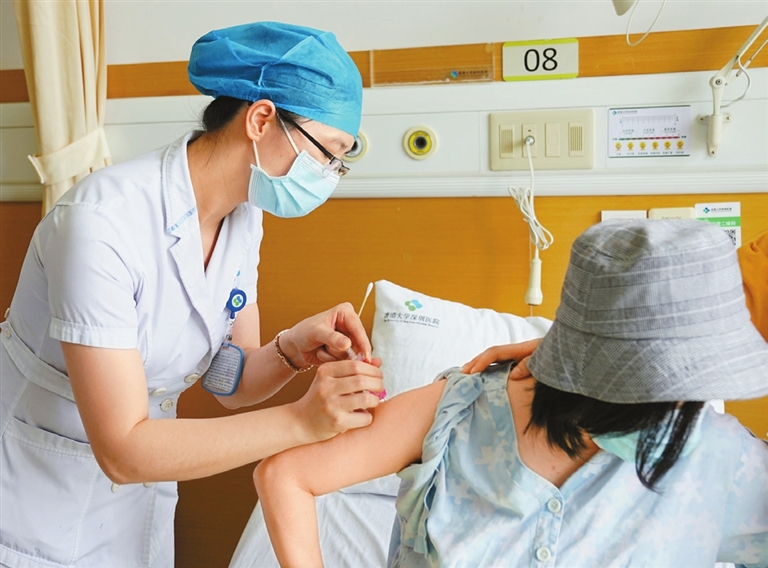
Zhang Yu JeniZhang13@163.com A PREGNANT woman surnamed Yang became the first patient in the Guangdong-Hong Kong-Macao Greater Bay Area (GBA) to use an imported drug that has been approved for pilot use at the University of Hong Kong-Shenzhen Hospital (HKU-SZH) under the “Hong Kong and Macao Medicine and Equipment Connect” policy Thursday. Yang was also the policy’s first beneficiary since its first batch of international advanced medicine and medical equipment arrived at the hospital April 16. “I couldn’t believe it was true when the doctor told me the news. I still feel very lucky,” Yang told reporters Thursday, when she received an injection of Rho(D) immune globulin, a medication previously unavailable on the Chinese mainland. Rho(D) immune globulin is used to prevent hemolytic disease of fetuses and newborns in Rh-negative mothers and to treat idiopathic thrombocytopenic purpura in people who are Rh positive. Yang, who is Rh negative, is 28 weeks pregnant and had planned to purchase anti-D (rh) immunoglobulin doses at a Macao hospital. However, she experienced premature membrane ruptures and was admitted to the HKU-SZH on April 23.
“I didn’t expect that I would have an emergency before I set off,” Yang recalled, adding that she was surprised to learn from the doctors that the hospital has been piloting the use of the drug since April 16.
Wang Jie, a consultant with the obstetrics and gynecology department of HKU-SZH, said that an Rh-negative mother generally needs two doses of Rho(D) immune globulin. The first dose should be administered when the expectant mother is 28 weeks pregnant and a second dose within 72 hours after the baby is born.
According to Lo Chung-mau, HKU-SZH chief executive, the policy implementation has brought practical benefits to patients, saving them the trouble and risks of obtaining urgently needed medications and medical devices from overseas.
The ultimate goal of the policy is to enhance the homogeneity and integration of health-care services within the GBA, said Lo.
HKU-SZH is authorized to pilot the use of medicines and medical devices from Hong Kong and Macao under the “Hong Kong and Macao Medicine and Equipment Connect” policy, as per a work plan issued by eight ministries and commissions in November last year.
The pilot period will run until July 31, 2021.
The policy states that the imported medicines and equipment should be already in the markets and used in public hospitals in Hong Kong and Macao and are urgently needed for clinical use on the mainland.
The first medical equipment introduced by the hospital under this policy is a magnetically controlled growing titanium rod used to treat scoliosis, which is now also available for patient bookings, said HKU-SZH. | 
